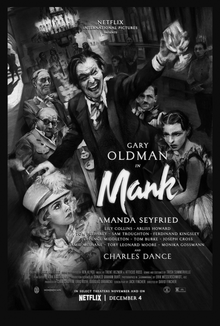Mank (2020)
In the modern age of cinema, there are movies (or filmmakers) that are so famous either for the right or wrong reasons to the point where they can be used as comparisons. For example, strong writing styles can have someone proclaim them to be either the Quinten Tarantino or Aaron Sorkin of that movie (or genre if they are that consistent). Superhero flicks such as Wonder Woman 1984 (2020) can be called "pulling a Spider-Man 3" due to quality affected by its numerous arcs and none of its potential being fully realized. In this case, there's a classic from the 1940s that made its mark to the point where it's used in the aforementioned way: Citizen Kane (1941). This brings us to Mank, which was directed David Fincher and is based on a screenplay by his late father that's connected to that 1940s classic. It was released on Netflix in early December 2020 but to prepare for it, I watched Citizen Kane for the first time on HBO Max (from their Turner Classic Movies collection). The week after that, I checked out Mank and after my viewing was impressed by the look but was underwhelmed by the niche script.
My thoughts on Citizen Kane (1941): Before seeing this, my only knowledge of it was the infamous "Rosebud" line that has been referenced a lot. This classic has an intriguing premise that's delivered on with a very nice flow of its past and present events. Peeling through the layers of this tycoons life in regards to how his life and career are affected by his egotistical selfish decisions makes an interesting drama. It doesn't go into the psyche of this individual as the narrative follows reports from individuals being interviewed but the rise and fall remains smoothly engaging. ⭑⭑⭑⭑⭑
The execution of the script it's using, however, affects the viewing experience in some unintended ways. The content here ends up being very niche leaning towards more advance films lovers and/or history buffs rather than something that casual audiences can like. The ambitious screenplay jumps around with many flashbacks needed more work and should have trim down (or cut out) the political third act since padded the long runtime.
How are the actors? In regards to story importance, the actor to focus on is Gary Oldman. Gary does a nice portrayal of a somewhat jaded alcoholic who has worked in the industry for a long time but his performance doesn't really elevate the material much. Honorable mentions Amanda Seyfried and Arliss Howard with the former having great chemistry with with Oldman as well as being a standout in her acting while the latter makes the most out of his limited screen time..
Overall Consensus: Mank thrives off of its excellent 1930s production design, pretty good cinematography, some standout scenes, and nice acting but its ambitious script doesn't flow well as a whole with rough pacing in a long runtime. ⭑⭑⭑3/4 Runtime: 2 hours 11 minutes R
Reasons to watch it: You are a fan of the aforementioned actors and/or director David Fincher. You like seeing filmmakers imitating the style of an era their period feature takes place in. You don't mind very niche ambitious screenplays that are only accessible for history (or movie) buffs. You like biographical dramas.
Reasons to avoid it: You aren't a fan of the aforementioned actors and/or director David Fincher. You have issues with very niche ambitious screenplays that are only accessible for history (or movie) buffs. You aren't into biographical dramas.






Comments
Post a Comment